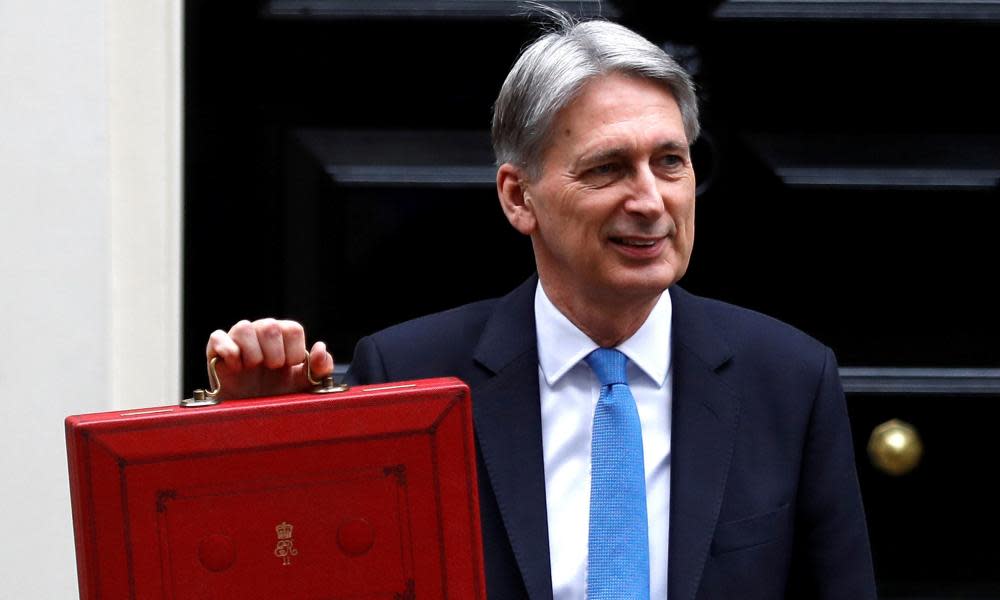A budget to end austerity? Only if Hammond makes the rich pay

How do Theresa May and Philip Hammond converse in private? I doubt he roared at her like Gordon Brown did at Tony Blair – “You’ve stolen my fucking budget” – even though she has. Prime ministers in a corner often do it. Blair did it from a TV sofa in 2000, panicking when a cash-starved NHS tipped into crisis: he pledged health spending would reach the EU average (an unknowable moving target). Familiar? May, facing a far worse NHS crisis, promised £20bn – and then went further. Confronting a fractious Tory conference she declared “an end to austerity” (meaning and price tag: equally unknowable).
Her Brexit conundrum of impossibilities is of her own making, drawing red lines round herself with no escape. Now she’s red-lined her chancellor: he must abolish the deficit, keep debt falling, cut tax thresholds and “end austerity”, just like that. Impossible, says the Institute for Fiscal Studies, the great arbiter. It will cost £19bn extra just to stand still, while still cutting another £7bn from benefits: in next Monday’s budget, the public won’t think that ends austerity. May’s foolish promise offers never-ending open goals for Labour.
The chancellor is said to be sulking – but from his face that’s hard to tell. Confronting a crescendo of demands, he is reported to relish sending away unfavoured ministers with fleas in their ears: no to Sajid Javid’s begging bowl for the police, despite robberies up by 22% in England and Wales, knife crime up 12%. No to bumptious Gavin Williamson for defence and armed forces’ pay. No to schools. No, he says now, to returning the £2bn stolen from universal credit – but he may be forced to respond to the demands of Heidi Allen’s doughty platoon of 30 Tory MPs. The IFS reminds him the NHS will go on needing many more rises to keep up with old age: will the extra £20bn be sucked into black holes of existing debt? The shy social care green paper will have to emerge from the shrubbery some time, demanding money with menaces for this collapsing service. Local government begs – but expect it yet again to carry the can for Britain’s disintegrating social fabric.
Add in every other stricken department – and then come all the hopeless pleas for yet more tax relief. Take this typical one for gym membership, unhelpfully promoted by NHS wrecker Andrew Lansley. It comes like every other bid with a reminder that prevention is cheaper than cure, but that’s a sum to make the Treasury groan. Every £1 spent will save £2.60 in health costs: the World Health Organization rates the UK 123rd out of 168 countries in the league table of least-active nations, where sitting for eight hours a day raises premature deaths by 60%. (To Treasury beancounters, early death is quite cost-effective: smoking brings in tax, and leads to quick death and unclaimed pensions.) The gym plan’s promoters conveniently ignore that higher earners would surely gain most.
That one is doomed. But tax reliefs of that absurdity slip into budgets as eye-catching sweeteners to raise a cheer, and are thereafter forgotten, never reassessed, costly barnacles on the ship of state. The IFS, the Resolution Foundation and others frequently expose the worst excrescences. The chancellor recently acknowledged that pension reliefs are “eye-wateringly expensive” – to howls of rage and faux indignation from his side, despite half the relief going to the richest 10%. Will he dare restrict relief to the basic tax rate, saving £10bn? If so, why stop there?
He could reap a bountiful harvest festival of reliefs, costing, says the Resolution Foundation, £155bn a year. That is the size of the welfare state for the better-off and the very rich. HM Revenue and Customs lists only 400 tax reliefs, but as Professor Adrian Sinfield of Edinburgh University unearths, the Office of Tax Simplification has found – but apparently ignores – a remarkable 1,156 lost in the mists of time. Not surprisingly the public accounts committee protests at the lack of knowledge about their purposes and costs.
Hammond has nothing to lose by scything through them all: Brexit has brought the country to its knees and threatens worse. (The IFS shows that “project fear” predictions were correct about a lost 2% of growth so far, though it didn’t happen overnight.) What better occasion than his spending review next year to plough up all the old reliefs? Entrepreneurs relief, a sham that does little for enterprise, costs £2.7bn and just 6,000 people benefited.
Farmland is another place to avoid tax: the mega-rich buy it to hand on tax-free to their children, as if they were real farmers. Why is capital gains tax on property and shares forgotten after someone dies? Tax relief for Alternative Investment Market shares, intended for startups, mainly benefits the super-rich. Better-off pensioners should pay national insurance, and property should be revalued for council tax. There are scores more of these bonanzas that the most reputable fiscal experts would abolish.
A garden of tax reliefs blooms out there, waiting to be gathered in. If Hammond dare not, then lucky Labour will reap them instead. Very few are likely to trouble the ordinary voter: squawks from those who have benefited richly over the years will be easily ignored. Austerity really could end if Hammond and May wanted it to. Their political lives will be short, so why not?
Well, because they are Tories. Instead, they plan to make savings by cutting public sector pay in the poorest areas, by introducing regional instead of national pay rates. Those with least will get less, making it even harder to attract good staff. This will widen the wealth gap between regions, deliberately impoverishing already “left behind” places. Tories see things differently.
• Polly Toynbee is a Guardian columnist

 Yahoo News
Yahoo News 
